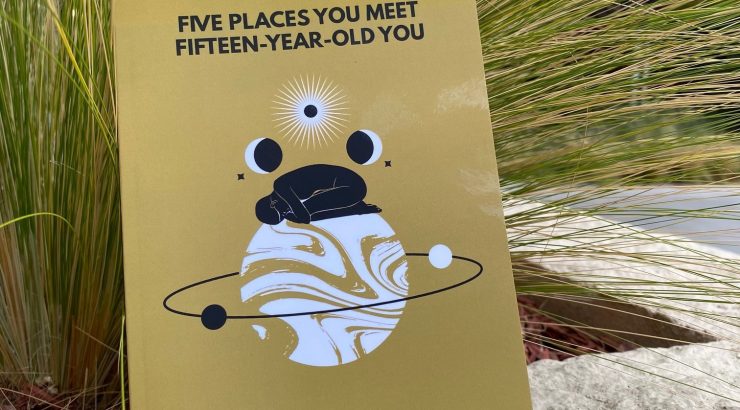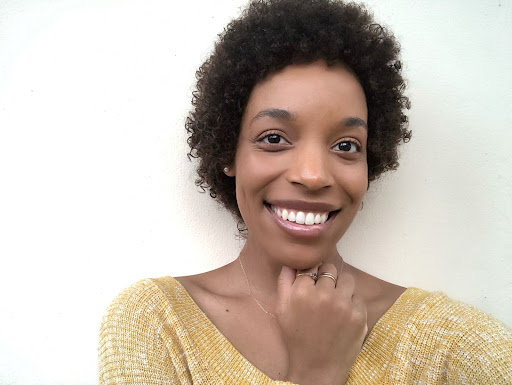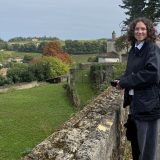
Alum Mariana Samuda on Five Places You Meet Fifteen-Year-Old You
October 22, 2021
Jamaican-born Mariana Samuda (‘18 MFA Creative Writing) has published work in Atticus Review, Moko Magazine, Headway Quarterly, and Hoot Review.
The Voice of Wilkinson had the opportunity to speak to Samuda about her new book, Five Places You Meet Fifteen-Year-Old You.
Enter for a chance to win a copy of Five Places You Meet Fifteen-Year-Old You in a book raffle! Sponsored by the Department of English!
Voice of Wilkinson: Your book starts with the speaker directly across from their fifteen-year-old self. I think we generally associate our teenage years with growing pains, awkwardness, and more than one or two “youthful regrets.” What drove you to focus on this time in our young lives, a time many would rather forget (or at least not think about!)
Mariana Samuda: I think it’s just that—because we want to forget it or pretend it isn’t a part of us. As an incredibly nostalgic person, there are parts of my life I always look back at with such fondness, but I couldn’t quite garner that same appreciation for my teenage years. Hindsight allows us to be so critical, and we often forget the feelings of the moment. I wondered what would happen if a narrator far removed from those ‘in-the-moment feelings’ had to confront them as their younger self with what they perceived to be the objectivity (and therefore arrogance) of hindsight.
Sandra Cisneros’ short story “Eleven” has a line that says, “Because the way you grow old is kind of like an onion…each year inside the next one.” This was also the epigraph to my thesis at Chapman! Our teenaged selves are still with us, no matter how old we get. I think it’s important that we take them out every now and again and make sure they’re doing well, so that we can know we’re doing well, too.
VoW: One line in the opening paragraph that really stood out to me was “you stare at the eight years younger version of yourself and try to recognize her.” Can you tell us about writing through the self-reflective process, particularly when considering ourselves, past and present, or teenage and adult?
MS: There’s an emotional cost and gain to the process, but I find the places we don’t want to return to are often the source of our healing. I spent a long time with this story, and it felt, at times, that I was walking barefoot up a very steep mountain. I had to straddle the line of self-reflection and imagination, and the best way to do that was through the use of second person. It allowed me to have this objective distance, while still allowing for the subjectivity that comes with self-reflection.
I took a nine-month break before writing the last two “places,” and that ended up being the best thing for the story. I had a professor in undergrad say that some stories and poems come to you too soon. I think there was still some growing to be done on my part before I could really take myself through the self-reflective process. I put a lot of trust in the timing of the process, and it worked in my favor.
VoW: Without spoiling the journey for our readers, how did you select the five places the narrator visits with their fifteen-year-old self?
MS: I always knew where it was starting, and then I went to watch a certain Broadway musical and that inspired a lot of the journey for that first place. Once I had the first place, I knew where the last place was going to be to serve as a contrast. After that, I thought of the journey of the narrator and the emotional arc and tossed around some ideas. I wanted some places rooted very firmly in reality, and others to be whimsical and imagined.
“Ultimately, I asked myself what stories I would want to tell my fifteen-year-old self and what questions she would have for me and found the places that best served those questions and answers.”
VoW: I was struck by the honesty between the narrator and their teenaged self. The honesty made me think of the half-truths we tell children, the way we attempt to protect youths by not being (at least fully) honest. What would you say the role of honesty and truth is between these two selves?
MS: Well, I think there’s tension between being fully honest or lying by omission. The narrator doesn’t want to tell the full story because of spoilers, but also fears confronting the reality that their teenaged self is going to have to go through. In that way, I definitely think the narrator is trying to protect their younger self. As for the teenaged self, I find there’s an innocence and hope that allows that self to be more honest and willing to speak the truth. That self can ask the tough questions, and though they might be scared of the tough answers, they still value the truth more.
I think it then becomes a story of emotional truth and honesty. Maybe the narrator can’t be completely honest about the events that will take place, but the fourth section shows that there is a truth that can be shared that is of way more value than a simple retelling of events. It is this truth—of the emotional arc that the narrator has gone through and will go through—that matters most. Most importantly, that their younger self should still have hope for the journey, even amidst the scary parts.
VoW: From time to time I hear the old question “if I could go back in time and give my younger self some advice, what would I say?” The implication is the only relevant knowledge is that from experienced adult to unexperienced child, but what do you think we could learn from our younger selves?
MS: Oh, so much!
“In writing this story, and doing all this self-reflection, it made me realize just how much my younger selves had to teach me, even some as close as two or three years ago.”
But as for those teenage years—the days would feel so long and full of endless potential. I was very privileged to have the safety net that should come inherently with childhood, and as a result, I got to do so much trying and failing, and therefore so much growing. The highs were so very high, and the lows really did feel like the end of the world. I think we lose that openness to feeling as we grow older. The knocks come, as they must with life, and our natural defense is to shy away from the hurt, close ourselves off, and harden. I think we could all learn to slow the days down, take in that white space in between the words, and embrace all the emotions along the journey.
VoW: For our incoming students to the MFA in Creative Writing program, what did you wish you had known starting your MFA? What’s something you appreciated about the program? Is there a takeaway that still serves you in your day-to-day endeavors?
MS: This is going to sound very obvious, but I wish I had spent more time writing. I was hesitant about experimenting within my own genre and with others. The program is set up in a way that encourages cross-genre work, but I was way too worried about getting it wrong to realize that was the only way to become the writer I wanted to be.
Chapman was such a lovely time in my life. It gave me a real sense of community and challenged me as a writer and a person. I did a lot of growing in those classrooms, learning from the funniest, most empathetic, incredible writers and educators that were my professors, and just as much from my peers in my cohort.
Richard Bausch once told me to get out of my own way with my writing, and I thought about that a lot when writing this book.
“It’s amazing what you can write when you stop trying to be a writer.”


